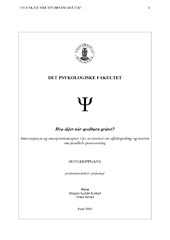Hva skjer når spedbarn gråter? Interosepsjon og emosjonskonsepter i lys av teorien om affektspeiling og teorien om prediktiv prosessering
Master thesis
Permanent lenke
https://hdl.handle.net/1956/21325Utgivelsesdato
2019Metadata
Vis full innførselSamlinger
Sammendrag
Den sosiale biofeedback teorien om affektspeiling (TAS) forklarer hvordan spedbarn utvikler en oppmerksomhet på fysiologiske aktiveringsmønstre, samt hvordan disse mønstrene kategoriseres i distinkte emosjonskategorier. Interosepsjon er definert som evnen til å sanse kroppens indre tilstand. Siden en av hovedfunksjonene til affektspeiling er å tilvende spedbarn deres kroppslige aktiveringsmønstre, argumenteres det for at teorien om affektspeiling forsøker å forklare utviklingen av interosepsjon. Tilvenningen til og kategoriseringen av emosjonelle aktiveringsmønstre antas å bli utviklet i interaksjoner hvor omsorgsgiver speiler spedbarnets affektuttrykk på en markert måte. Teorien om affektspeiling antar eksistensen av grunnleggende emosjoner og en kontingensoppdagelsesmodul. Mentalisering defineres som evnen til å tilskrive mentale tilstander til seg selv og andre. I teorien om affektspeiling argumenteres det for at emosjoner er mentale tilstander. Derfor kan teorien om affektspeiling forstås som en modell for hvordan begynnende mentalisering utvikles. Kritikk mot sentrale antagelser i teorien presenteres, deriblant kritikk av teorien om grunnleggende emosjoner og en medfødt, domenegenerell kontingensoppdagelsesmodul. Teorien om prediktiv prosessering (PP) foreslås som et alternativt rammeverk for å forstå utviklingen av interosepsjon og emosjonskonsepter. Den foreslås derfor også å forklare utvikling av begynnende mentalisering. The Social Biofeedback Theory of Affect-Mirroring (TAS) explains how infants develop an awareness of physiological activation patterns, as well as how those activation patterns are categorized into discrete emotion categories. Interoception is defined as the ability to perceive the internal state of one’s body. As one of the main functions of affect mirroring is to sensitize infants to their bodily activation patterns, it is argued that the theory can be conceptualized as explaining the development of interoception. The sensitization to and categorization of emotional activation patterns is believed to develop during situations when caregivers mirror infants’ affect expressions in a marked manner. The theory of affect mirroring assumes the existence of basic emotions and a contingency detection module. As it is argued in the theory that emotions are mental states, and mentalization can be defined as the ability to attribute mental states to one self and others, the theory of affect mirroring can be understood as a theory of how emerging mentalization develops. Challenges to key assumptions in the Theory of Affect Mirroring is presented, including a critique of the Theory of Basic Emotions and the concept of an innate, domain general contingency detection module. The Theory of Predictive Processing (PP) is suggested as an alternative framework for understanding the development of interoception and emotion concepts, and therefore is hypothesized to also explain the development of emerging abilities to mentalize.
